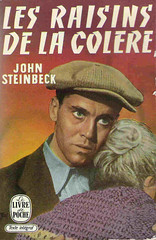John Steinbeck on the Current Economic Crisis

I came across this Steinbeck quote today while looking through Wink’s book “Engaging the Powers,” it seemed to me to be getting at the nature of the struggle we face today. Especially when it comes to the bank being an uncontrollable monster, a power, that is beyond our control:
The owners of the land came onto the land, or more often a spokesman for the owners came…Some of the owner men were kind because they hated what they had to do, and some of them were angry because they hated to be cruel, and some of them were cold
because they had long ago found that one could not be an owner unless one were cold. And all of them were caught in something larger than themselves…If a bank or a finance company owned the land, the owner man said, The Bank-or the Company-needs-wants-insists-must have-as though the Bank or the Company were a
monster, with thought and feeling, which had ensnared them. These last would take no responsibility for the banks or the companies because they were men and slaves, while the banks were machines and masters all at the same time. Some of the owner men were a little proud to be slaves to such cold and powerful masters. The owner men sat in the cars and explained. “You know the land is poor. You’ve scrabbled at it long enough, God knows.”
The squatting tenant men nodded and wondered and drew figures in the dust, and yes,
they knew, God knows. If the dust only wouldn’t fly. If the top would only stay on the soil,
it might not be so bad.
The owner men went on leading to their point: “You know the land’s getting poorer. You
know what cotton does to the land; robs it, sucks all the blood out of it.”
The squatters nodded-they knew, God knew…
Well, it’s too late. And the owner men explained the workings and the thinkings of the
monster that was stronger than they were. “A man can hold land if he can just eat and
pay taxes; he can do that.”
“Yes, he can do that until his crops fail one day and he has to borrow money from the
bank.”
“But-you see, a bank or a company can’t do that, because those creatures don’t
breathe air, don’t cat side-meat. They breathe profits; they eat the interest on money. If
they don’t get it, they die the way you die without air, without side-meat. It is a sad thing,
but it is so. It is just so.” …The bank-the monster has to have profits all the time. It can’t
wait. It’ll die. No, taxes go on. When the monster stops growing, it dies. It can’t stay one
size.”
The squatting men looked down again. “What do you want us to do? We can’t take less
share of the crop-we’re half starved now. The kids are hungry all the time. We got no
clothes, torn an’ ragged. If all the neighbors weren’t the same, we’d he ashamed to go to
meeting.”
And at last the owner men came to the point. “The tenant system won’t work, any more.
One man on a tractor can take the place of twelve or fourteen families. Pay him a wage
and take all the crop. We have to do it. We don’t like to do it. But the monster’s sick.
Something’s happened to the monster.”…
The tenant men looked up alarmed. “But what’ll happen to us? How’ll we eat?”…
“We know that-all that. It’s not us, it’s the bank. A bank isn’t like a man. Or an owner
with fifty thousand acres, he isn’t like a man either. That’s the monster.”…”Sure,” cried the tenant men, “but it’s our land. We measured it and broke it up. We were born on it, and we got killed on it, died on it. Even if it’s no good, it’s still ours. That’s what makes it ours-being born on it, working it, dying on it. That makes ownership, not a paper with numbers on it.”
“We’re sorry. It’s not us. It’s the monster. The bank isn’t like a man.”
“Yes, but the bank is only made of men.”
“No, you’re wrong there-quite wrong there. The bank is something else than men. It
happens that every man in a bank hates what the bank does, and yet the bank does it.
The bank is something more than men, I tell you. It’s the monster. Men made it, but they
can’t control it.”
…”No. The bank, the monster owns it. You’ll have to go.”
…”But if we go, where’ll we go? How’ll we go? We got no money.”
“We’re sorry,” said the owner men. “The bank, the fifty-thousand-acre owner can’t be
responsible…”
And the owner men started their cars and rolled away.
(John Steinbeck, The Grapes of Wrath: Chapter 5)
![Reblog this post [with Zemanta]](http://img.zemanta.com/reblog_e.png?x-id=5737451c-b599-4740-82b6-58bac4015d2b)